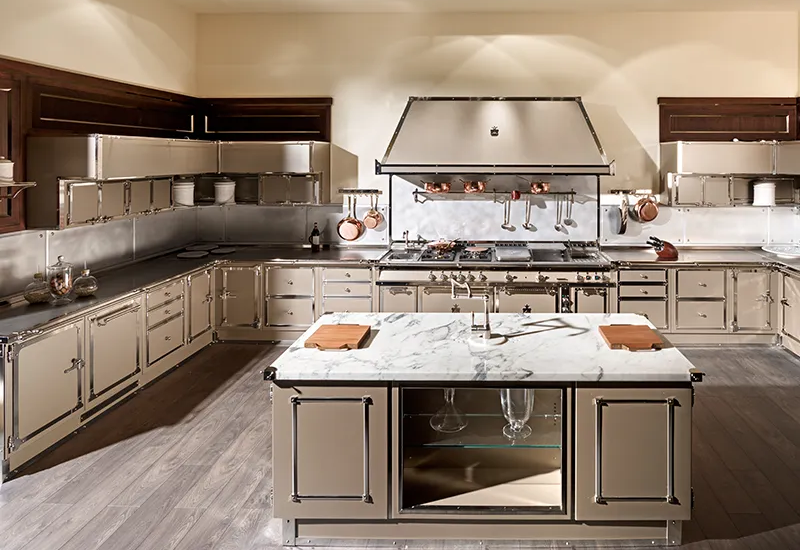Keeping a kitchen clean and tidy is an important part of maintaining a healthy and safe home. A clean and tidy kitchen is not just beautiful but also ensures that food is prepared and stored properly, which reduces the chance of contracting food-borne illnesses. Learn how to clean your kitchen exhaust fan effectively with our step-by-step guide, included in The Ultimate Guide to a Sparkling Clean Kitchen
Here are some suggestions to achieve a sparkling clean kitchen:
Step 1. Cut the clutter and then do the dishes.
In order to really get a deep clean going, everything needs to be atleast organized, so first, do away with the mess. Put everything that doesn’t belong in the kitchen in a bag or box and place it in another room to deal with later. After that, put everything that belongs in the kitchen in its proper place, including putting all the dirty dishes in (or close to) your sink.
Clean up the dirty rugs, dish rags, aprons, and towels, and get a load of laundry ready- wash the rugs separately from the towels.
Take care of those dishes! It’s impossible to clean if you can’t use the sink properly. So wash, dry, and then put away all the dishes. If you have a dishwasher, fill it in and then proceed to the next step while it is running.
Check out the kitchen, and appreciate how much better your kitchen looks after just the initial step!
Step 2. Dust from top to bottom
Top to bottom is the ideal way to dust any space unless you want to see the dust from up high floating down, and landing on the items you just dusted down low
– Up high: Clean the light fixtures, tops of cabinets, tops of shelves, and the top of your fridge. In the middle: Dust windows and sills, tables, shelves, and so on.
– Down low: Dust the baseboards and then dust mop or sweep the floor to remove most of the accumulated debris from the floor so you don’t track it all over the place while you’re cleaning.
After dusting, follow up with a moist microfiber cloth to remove stuck-on grease or dirt from the same surfaces. Why microfiber? It removes most dirt, grime, grease, and bacteria from surfaces without the need for cleaners.
Step 3: Clean the countertops, cupboards, and pantry
For cleaning the countertops, clear them of any clutter, and then use a multi-purpose cleaner to clean them.
Before putting each item back on the countertop spot, wipe it down with a warm, moist microfiber cloth.
To clean the kitchen cabinets, remove the contents and throw away the items that have expired or are no longer needed. Clean the inside of the cabinet using an all-purpose cleaner. Then, wipe it down and replace the items that go back in.
For a clean pantry, remove all items, tossing, composting, or recycling as you go. Clean up your shelves, sweep and mop the floor, and then put everything back in place after cleaning every item.
Step 4. Clean the cooker
– The stovetop
To clean the stove burners and metal grills on a gas stove, soak them in lukewarm water and then add a little dish soap. For electric stovetop burners, gently clean dirty areas using soap and a microfiber cloth and avoid the connection points. To clean the glass stovetop, wash it with a microfiber cloth and vinegar or water, then clean it with the glass-cleaning microfiber cloth.
– The oven
Mix half a cup of baking soda and two to three tablespoons of water to make a paste. Use the paste and a gentle scrub brush to scrub the interior of your oven, avoiding the oven’s elements. Allow the paste to sit for a few hours, then use a microfiber cloth, water, and distilled white vinegar to remove the baking soda and give it a shine.
Step 5. Clean the sink
Your sink gets soiled fast, but the garbage disposal becomes filthy, grimy, and moldy almost overnight.
Use a paste of baking soda and water and a microfiber cloth or sponge to scrub the entire sink basin, and then use an old toothbrush coated in the mixture to scrub as much of the drain area as you can reach. Spray distilled white vinegar over the baking soda, which will fizz up and release any stubborn gunk. Allow it to sit for a while, scrub, rinse with water, and voila! Clean sink!
To naturally clean your drain, pour a half-cup of baking soda and a half cup of vinegar. Put the plug in the drain and let it sit for at least an hour. Pull the plug and pour boiling water down the drain.
It is also recommended to clean your kitchen tiles at least once a week to prevent the build-up of dirt and grime.
Step 6: Wash the refrigerator
Ah, one of the most-feared kitchen cleaning tasks: cleaning the refrigerator.
Begin by emptying everything out of your refrigerator. Dispose of anything that appears like an unfinished lab experiment or is expired. Place the edible contents on your now-empty countertops.
Take out the removable trays, drawers, and shelves and soak them in warm soapy water.
Use a warm, damp microfiber cloth to scrub the inside of the refrigerator and the door. As they air dry, wash the drawers and shelves in hot soapy water, rinse thoroughly, dry, and replace them.
Rinse and recycle the containers you emptied out and clean the exterior of your refrigerator.
Step 7: Empty the garbage, and clean the can
While we may dismiss cleaning the sink because it’s always soapy, we usually avoid scrubbing the trash can because we think it’s “always trashy.” Not today, home citizen!
Remove that stinky garbage. Turn the whole can upside down over the outdoor bin to empty any wayward trash. If it’s really disgusting from the inside, then rinse it off -or give it a good, hot shower, and then scrub it with a bristly brush.
If it’s not too bad, use a multi-purpose cleaner to clean the exterior and interior of the container –get the lid, hinges, and foot pedal– then add a new, eco-friendly liner, and your garbage will stink no more.
Step 8: Cleaning the floor
It’s time to vacuum thoroughly -Run the hose over the baseboards, behind the fridge, under cupboards and shelves, and in all crevices and cracks inside your kitchen.
Give your floor a good microfiber mopping using the appropriate cleaner for your floor type.
Step 9: Cleaning kitchen exhaust fan
If you want to clean kitchen exhaust fan, turn off the power to the fan. Then, remove the fan cover and soak it in warm soapy water. Next, use a scrub brush or sponge to clean the blades. Rinse the fan cover and other components with clean water and dry them with a clean cloth. Finally, reassemble the fan and turn the power back on.
Step 10. Replace textiles, and admire your work
Now that your kitchen is spotless from top to bottom, you can put the clean rugs back in place and load the drawers with fresh dish towels.
Make a list of the things you’re running out of, and then use your reserves to stock up on kitchen essentials such as reusable paper towels, recycled aluminum foil, coffee filters, and sandwich bags. Make sure to give the kitchen a final look-around to ensure you got it all. Tie up any loose ends and put your tools and cleaning products away.
Now, it’s time for you to sit back, crack open a bottle of something fizzy and cold and admire your work. It’s done! Enjoy the bliss of sparkling stainless steel, gleaming glass, and a flawless floor — and enjoy it while it lasts.






